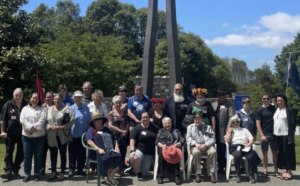As part of a Valley Profile series, MEGHAN HAWKES explores our local history by seeking out stories of life and death in the Thames Valley.
High spirits were evident in the streets of Paeroa in March 1915, despite war having been declared eight months earlier.
Land for settlement in the Hauraki district was being balloted and all along the main street groups gathered discussing their chances and their plans for the future when they got “on the land”.

The mid-morning trains steamed in bringing large numbers of people, while several coach loads came from various parts of the Thames Valley and outer districts.
Several women represented husbands, brothers and sweethearts away at war. Among this hopeful throng was young Albert Moor, who had come to New Zealand five years previously for his health. He had worked on Mr Cullen’s Maratoto farm and then for Hugh Morrison at Hikutaia.
There were hundreds of applicants in this great rush for land and all hopes rested on the roll of a marble.
The ballot system involved numbered marbles being placed in a locked revolving box in equal number to the applications for land received.
Marbles were withdrawn and whoever held the corresponding number would be allocated that block of land. But Albert’s number was not drawn and he left New Zealand three days later on the SS Rotorua, for England, arriving in May, 1915.
There would be more ballot marbles drawn in New Zealand a few months later, this time as part of conscription – compulsory enrollment for war service. Albert, though, would not have to be compelled to do his bit.
Once in England, after a short holiday, he approached the War Office in London, offering his services in any department, but was unsuccessful.
He later applied again, and this time was promised an opening if he underwent an operation. He spent three weeks in hospital and was recovering when he had a cycle accident, which ended his prospects of entering the army.
Undeterred and determined, he managed to enter the Navy, signing on to the hospital ship Dover Castle as a bath attendant.
He was stationed at the Dardanelles during the height of the fighting, and later at the Persian Gulf during the Mesopotamia Campaign – a battle between British and Indian troops against the Ottoman Turks in Mesopotamia (now Iraq).
It was a lengthy and tragic campaign marked by bitter fighting in a harsh climate.
Albert described the sufferings of the troops as terrible. Wounded soldiers waited more than 24 hours before arriving at the first dressing station; and scores of lives were lost through utter neglect. Medical supplies that should have been sent to relieve the suffering of the wounded were lacking. On May 26, 1917, the Dover Castle was on passage from Malta to Gibraltar, 50 nautical miles north of Bône, Algeria when she was torpedoed twice by the UC-67, a German mine laying submarine.
The first explosion killed several boiler stokers. The wounded were evacuated on to the HMS Cameleon and the Dover Castle’s captain and a few crew tried to save the ship, but she was hit by a second torpedo an hour later, sinking in three minutes.
The crew and occupants were brought ashore to the British Vice Consulate at Bône, Algeria, around 11pm. Everything possible at that hour of the night was done for them, and 500-odd were transferred to the military barracks.
Albert’s persistence had seen him journey to New Zealand, attempt to carve out a new life for himself, return to England and tenaciously seek war employment. But now Albert’s number was up. He had been suffering from consumption, a slow moving lung disease, for years.
When the Dover Castle was torpedoed, Albert was in the last stages of the illness and he fell victim to the shock of the attack, exposure, and general fatigue, dying from a lung hemorrhage at 5am on May 27.
He was buried the following day by the Army chaplain in the section of Bône cemetery consecrated to soldiers and sailors.
The funeral was attended by nearly all the members of the crew, a detachment of British soldiers, with their officers, the ladies of the Red Cross Society, a detachment of French soldiers, and very many residents of the town. The sailors brought a wreath in porcelain for the grave.
The news of Albert’s death reached Hikutaia through Fred Blyth, his friend and a Paeroa storekeeper, who received a letter from Albert’s parents enclosing information from the British Vice Consul.
Fred passed this on to the Ohinemuri Gazette, writing: “I am sure the residents of Hikutaia will learn with sorrow the circumstances of his death and can claim him as a hero, fighting for his country and his flag”.
The British Vice consul informed Albert’s parents a wooden cross would be put on Albert’s grave and it would be looked after by a local society. The published letter was headed: A tragic death – a brave boy from Hikutaia.
Although not an Anzac, Albert is representative of hundreds of men whose path in life was altered by the random roll of a marble.




